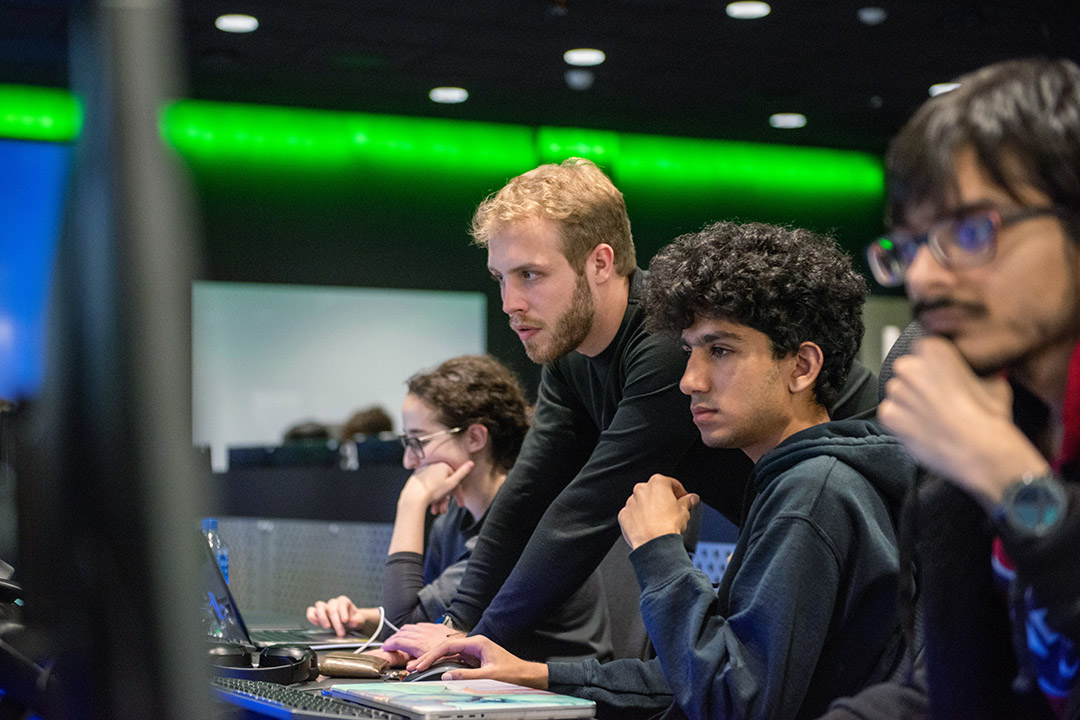Students find community through RITSEC cybersecurity club
Eaton sponsors RIT club to prepare next generation of cybersecurity professionals
Aum Patel
RIT students can find a community of security enthusiasts in the university’s cybersecurity club, RITSEC. Frequent collaborator Eaton recently hosted a hackathon for students and provided a $125,000 gift to support the club. Anthony Ioppolo, president of RITSEC, helps another student work through a challenging puzzle at the hackathon.
RIT students can unlock a community through the university’s cybersecurity club, RITSEC. As one of the largest collegiate cybersecurity clubs of its kind, RITSEC helps make RIT a top place for cybersecurity education, training, and research.
With about 250 participants each year, the academic club draws students from around campus who have enthusiasm for security. The club is receiving support from industry, including a recent gift from Eaton.
“Some people just want to learn how to pick locks, while others want to learn everything they possibly can about cybersecurity, and we welcome them and everyone in between,” said Anthony Ioppolo, a fourth-year cybersecurity BS/MS major and president of RITSEC. “At the end of the day, our members learn how to do some really cool things, make lifelong friends, and become a part of RITSEC’s community.”
During weekly meetings, students will take a deep dive into topics like penetration testing, wireless security, and physical security. Students can find their niche as they demo and practice their new skills. Past projects included pulling weather data from passing satellites and reverse engineering malware. Other student researchers will present their hacking research—and the responsible disclosure that goes with it.
The club also hosts several cybersecurity competitions that pull thousands of participants from across the university, the country, and the globe. In Red vs. Blue-style competitions, students try to protect networked infrastructure and services from an attacking RITSEC Red Team. Other competitions include Capture the Flag and King of the Hill-style cybersecurity challenges.
“All of these competitions are built by and for students, with a fantastic group of members that manage and create the infrastructure to support them,” said Ioppolo.
The club actually inspired second-year Kasey Kiggins to double major in cybersecurity and computer engineering technology.
“Several members were working on a project involving hardware—from there my interests were piqued and I started taking classes to learn more,” said Kiggins, who is head of education with RITSEC. “Being in the club is a great way to kick off your career. Take me for example. At a RITSEC career fair recruiting event with several of our sponsors, I met with and interviewed at the company where I will be working this summer.”
On Nov. 15, long-time collaborator Eaton gave $125,000 in support of developing the next generation of cybersecurity experts. Eaton is a global power management company that offers an array of electrical products and services. The club space, located on the second floor of Cybersecurity Hall, has been renamed the Eaton RITSEC Collaboratory.
“Demand for cybersecurity talent is at an all-time high, and collaboration with RIT provides students a platform to test their skills with Eaton products and solutions,” said Max Wandera, director of the Product Cybersecurity Center of Excellence at Eaton. “The quality of work by RIT students is outstanding, and our collaboration is equipping the next generation of cybersecurity experts with the training and field experience to build secure products. Student coaching on assessment of power management for cybersecurity is key to their development and leads to a stronger pipeline of industry talent.”
After the gift announcement, Eaton hosted a hackathon for RITSEC students. Industry professionals watched as teams of four competed in a Capture the Flag challenge.
Eaton offers students practical opportunities and access to its cybersecurity engineers and training. Graduate students can also work with Eaton experts on new research ideas solving cybersecurity challenges. Eaton also employs RIT co-op students and has hired RIT graduates.
In 2018, the company began supporting the Eaton SAFE (Security Assessment and Forensic Examination) Lab at RIT, where students get hands-on experience performing system and network security assessments for a wide range of partners. The lab is located in RIT’s ESL Global Cybersecurity Institute. The university’s nationally recognized cybersecurity degree programs are part of RIT’s Golisano College of Computing and Information Sciences.










